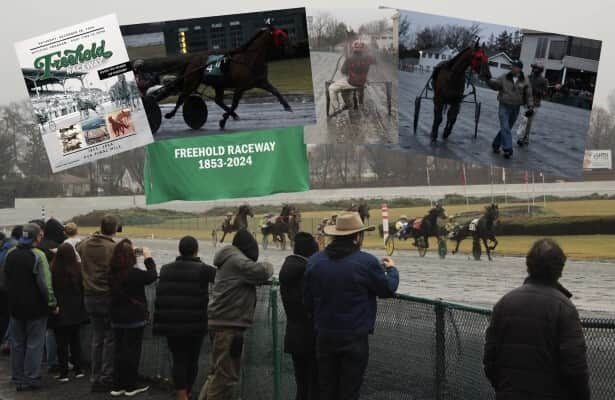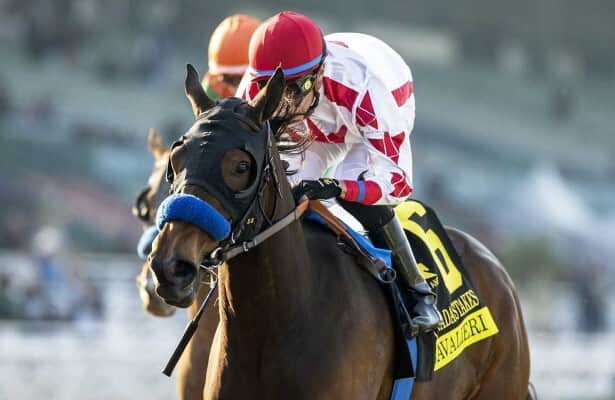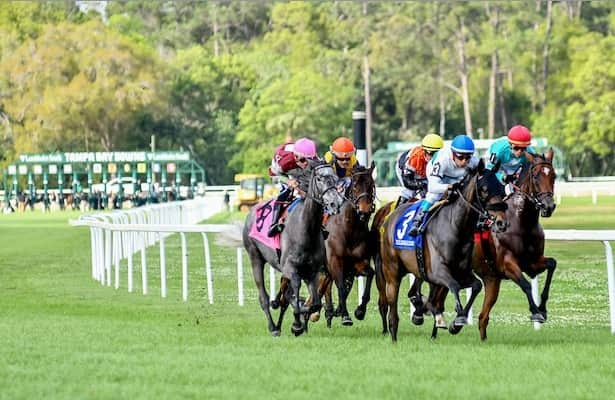After 171 years, America’s oldest track closes at Freehold

Photo:
Freehold Raceway / Facebook
At 4:24 p.m. EST on a gray, misty Saturday, Freehold Raceway
went out of business, running its last harness race 171 years after it opened.
It was America’s oldest active venue for racehorses, and the farewell looked
all too familiar.
Maybe not the weather, but the mood felt the same, even
watching on a computer screen from more than 600 miles away. It was reminiscent
of the final day at Arlington’s three years ago and at Golden Gate Fields six
months back. The demise of Garden State Park in 2001 and Atlantic City Race
Course in 2015 established the regretful template in New Jersey.
What was reported to be a larger-than-normal but
smaller-than-heyday crowd of at least 1,000 people showed up to celebrate the
past, prolong the present and damn the future. Like all other track closings,
it had a Dickensian Christmas mood, ghosts and all.
This soulless shuttering came with little notice. Penn
National Gaming, which partnered with Greenwood Racing to buy Freehold for $46
million in 1998, announced in September it was closing the track and the Favorites
off-track betting parlor in Toms River, N.J. It did so with an abruptly frosty layoff
notice to employees.
“Unfortunately, the operations of the racetrack cannot
continue under current conditions, and we do not see a plausible way forward,” Freehold
general manager Howard Bruno wrote at the time.
The sorrowful tomorrow finally arrived Saturday. In a span
of just under four hours, 11 races worth $302,600 in increased purses were run,
including nine for pacers and two for trotters.
“I promise I’ll do my best not to tear up,” track announcer
Larry Fox said during the final post parade. For the most part, he was a man of
his word.
The $8,800 finale for non-winners of $3,500 in their last
five starts was won by a pacer named T’s Raider II, a 4-year-old bay gelding. With
Johnathan Ahle driving for co-owner and trainer Rachelle Morris, he drew off by
5 3/4 lengths at the end of the two-lap mile. It was a popular win since he was
the odds-on favorite in the field of eight. Who knows how many of those tickets
actually will be cashed rather than made into souvenirs?
“I implore the fans to erupt and cheer as you voice and echo
the weight and legacy of Freehold Raceway,” Fox said in his final call.
They obliged him, many walking out onto the track apron from
the sheltered grandstand. A little rain in the gloaming of a 48-degree winter
afternoon was not going to stop them from drinking in that scene one last time.
The winner’s circle did not just include Ahle and Morris and
co-owner Howie Gluck. There were plenty of people who wanted to get one last selfie
with one last winner. Writing for US Trotting, Katie Eick said that even T’s
Raider II “was patient as everyone lingered in the winner’s circle, trying to
make the moment last as long as possible, not yet ready to say goodbye.”
As the day progressed all too quickly and ceremonies between
races honored past champions, names like Riyadh and Pine Chip and Zippy Chippy
and Paddy’s Laddy and memories like the triple dead heat in ’53 flashed before
the minds’ eyes of longtime racegoers. Fox’s very name brought to mind his
iconic predecessor Larry Lederman, the voice of Freehold who died in March.
“Everybody here is basically family,” owner-trainer Brandon
Mongiello told New Jersey News 12. “It’s the same people every week, and it’s a
shame this has to come to an end.”
It all started eight years before the Civil War. During the
Franklin Pierce administration, when New Jersey was one of the 31 states, the
inaugural Monmouth County Agricultural Fair in 1853 included harness races on
the property midway between Princeton and the Jersey Shore. There were idle
periods and even a nearly half-century state prohibition on gambling. For the
most part, the races went on and led to Freehold becoming New Jersey’s first
pari-mutuel track in 1941.
Freehold thrived in the post-war era when horse racing was
the only legal form of gambling on the eastern seaboard. It even survived a
1984 fire that destroyed the grandstand.
The beginning of the end might be pinpointed to 1978, when the
first casino opened in Atlantic City. From that seedling came alternative forms
of gambling, simulcast signals from other tracks and New Jersey’s
groundbreaking U.S. Supreme Court case that ended the national ban on sports
wagering in 2018.
With all sorts of gambling available on home TV and
eventually handheld devices, a day at the races grew less attractive. Attendance
and handle plunged and tracks closed, not just in New Jersey but across the
country and even around the world. Now only Monmouth Park and the Meadowlands are
hosting live horse races in the state.
There has not been any announcement about Penn National’s for
the 57-acre Freehold property. There have been local media reports that a
housing development is the most likely outcome, even as there has been a
last-ditch effort by horsemen to save the track. As was the case before Arlington
Park was torn down last year, that feels like a long shot.
“To everyone who made Freehold Raceway so extraordinary,”
Bruno wrote Saturday, “we wish you all the best in your future endeavors and
hope our paths may cross again.”
Related
Leading Parx jockey Sanchez will serve 7-day suspension
Photo: Jason Moran / Eclipse Sportswire Jockey Mychel Sanchez will serve a seven-day suspension and pay an additional $1,750 in fines
Bill Mott talks about plans for Sovereignty, Just F Y…
Photo: Gulfstream Park / Lauren King Sovereignty, dramatic late-running winner of the Fountain of Youth (G2) March 1, is being pointed
Up-and-coming Cavalieri chases Grade 1 glory in Beholder Mile
Photo: Santa Anita / Benoit Photo Cavalieri and Alpha Bella, who finished one-two in the Grade 3 La Cañada in January at Santa Anita,
4 stakes showcase shipping stars on Tampa Bay undercard
Photo: Gonzalo Anteliz Jr. / Eclipse Sportswire The stars will shine Saturday at Tampa Bay Downs, and not just in the Grade 3 Tampa Ba











